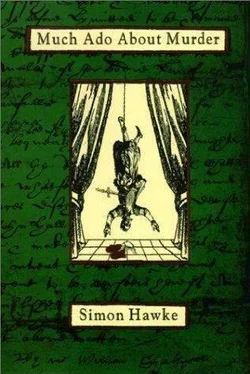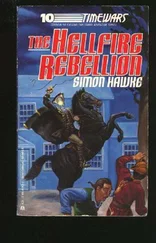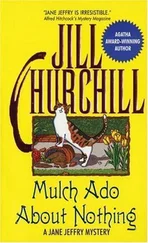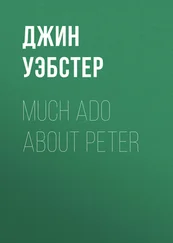Simon Hawke - Much Ado About Murder
Здесь есть возможность читать онлайн «Simon Hawke - Much Ado About Murder» весь текст электронной книги совершенно бесплатно (целиком полную версию без сокращений). В некоторых случаях можно слушать аудио, скачать через торрент в формате fb2 и присутствует краткое содержание. Жанр: Исторический детектив, на английском языке. Описание произведения, (предисловие) а так же отзывы посетителей доступны на портале библиотеки ЛибКат.
- Название:Much Ado About Murder
- Автор:
- Жанр:
- Год:неизвестен
- ISBN:нет данных
- Рейтинг книги:5 / 5. Голосов: 1
-
Избранное:Добавить в избранное
- Отзывы:
-
Ваша оценка:
- 100
- 1
- 2
- 3
- 4
- 5
Much Ado About Murder: краткое содержание, описание и аннотация
Предлагаем к чтению аннотацию, описание, краткое содержание или предисловие (зависит от того, что написал сам автор книги «Much Ado About Murder»). Если вы не нашли необходимую информацию о книге — напишите в комментариях, мы постараемся отыскать её.
Much Ado About Murder — читать онлайн бесплатно полную книгу (весь текст) целиком
Ниже представлен текст книги, разбитый по страницам. Система сохранения места последней прочитанной страницы, позволяет с удобством читать онлайн бесплатно книгу «Much Ado About Murder», без необходимости каждый раз заново искать на чём Вы остановились. Поставьте закладку, и сможете в любой момент перейти на страницу, на которой закончили чтение.
Интервал:
Закладка:
“I would have thought not,” Tuck replied. “But if you did not come for me, why did you come?”
“ ‘Tis possible, is it not, that I came for myself? To make a new beginning? To rebuild my fortune? Or do all things have to be concerned only with you?”
Tuck frowned. “You mean… you have come here to live?” He shook his head, puzzled. “What of your wife?”
His father looked away. “She ran off.”
“All. Well… I am sorry.”
“No need. I do not require your pity. I could have gone after her, I suppose. Taken a cane to her, as she deserved. But then I thought, why bother? What need have I of an ungrateful and disloyal wench? ‘Tis just as well she left. Good riddance to her, I say. Aye, good riddance, indeed.”
“Indeed,” Tuck said.
There was an awkward silent moment that seemed to stretch uncomfortably. It seemed as if neither one of them quite knew what to say next.
“Have you found a place to stay?” asked Tuck, finally. He dreaded hearing the reply. He could not imagine having to share quarters with his father. There was barely enough room for him and Will. And inflicting his father upon Will would be cruel beyond all measure. But, still, he was his father, after all. “It can be difficult finding a place to stay in London these days,” he added, “what with so many people arriving from the country. Rooms are often scarce and-”
“Oh, I have accommodations,” his father replied, with a dismissive wave. “I may have fallen upon hard times, but I am still not without some influence in London, you know. You need not concern yourself on my account. Besides, I have no intention of staying in some hovel of a tavern, sleeping on some flea-infested mattress, next to some unwashed mountebank.” He curled his lip in a sneer. “Nay, you need not worry. I was quite capable of securing my own lodgings.”
“I am glad to hear it,” Tuck replied, meaning every word. He avoided rising to the bait. He would not have wished to have his father stay at the Toad and Badger, in any case. He did not imagine that Symington Smythe II and his airs would go over very well with Courtney Stackpole. “Well, then, if there is anything else that I can do to help, then you will please be sure to let me know.”
“As it happens, there is,” his father replied. “The move to London, the journey, and finding lodgings and all that, has left me a bit out at the elbows, so to speak. Purely a temporary situation, I assure you, and one that I intend to remedy as soon as possible, but in the meantime, if you could see your way clear to granting me a small loan of a few pounds, I would be grateful.”
“Of course,” said Tuck, reaching for his purse. “How much will you need?”
“Oh, that should be sufficient, I should think,” his father replied, taking the purse out of his hand. “No need to trouble yourself further. I am sure I can manage with this.”
A bit taken aback, Tuck did not quite know what to say.
“Oh, and by the by, your uncle asked me to give you this,” his father added, handing him a letter. “He sends his warmest affections and all that sort of thing. Well, I am grateful for this, son. I shall try to repay it at the earliest opportunity. No need to trouble yourself further on my account. I can find my own way back. I have a carriage waiting.”
“A carriage?” Tuck said.
“Aye. Astonishing what these fellows charge. Bloody brigands. But one simply cannot go about slogging through the mud, now can one? Well, I shall be seeing you, I suppose. Good luck and all that sort of thing.”
He turned and walked away without a backward glance.
“A carriage,” Tuck said to himself, shaking his head in disbelief. “He asks me for a loan, takes all my money, and then drives off in a bloody carriage!”
He glanced down at the letter in his hand. He recognized his uncle’s handwriting. For all that Thomas Smythe was just a simple craftsman, his chancery hand was every bit as fine as that of any London scribe. He eagerly opened the letter and read:
My dear boy,
I trust this letter finds you well. Your father has promised that he would deliver this to you at the Burbage Theatre, where I told him you could most easily be found. Doubtless, you shall be surprised to see him, and some word of explanation is most likely in order, since I do not expect him to enlighten you, or else if he does, at least to some extent, explain himself, then I would wish for you to hear my side of it.
In short, I have given him the boot. For all that he is still my brother, I could not bear his insufferable presence in my house one moment longer. I never did begrudge him his inheritance, and although he never once saw fit to share any of it with me, as I continue to believe our father wished for him to do, I bore him no ill will. When, through his own profligate intemperance and uncontrolled ambition, he had squandered nearly the last penny he had left, I took him in, for he was still my family, and I believed that perhaps his fall might have taught him some humility. His wife ran off with some itinerant peddlar, as I understand it, though that is Symington’s version of events and, as such, the details are suspect. Still, there is no question that the woman left him when the money was at last all gone, so mayhap there is truth to how he says it came to pass. Either way, it makes little difference. He had no one to take care of him, and no means to do it on his own, and so, somewhat reluctantly, I must confess, I took him in.
I had forgotten just how difficult a person he could be, and how trying was his temper, and how utterly selfish and ungrateful he was, and always had been. I shall not recite the entire litany of offenses that he gave to me, nor regale you at length with how, in his foolish thoughtlessness, he had nearly managed to burn down my home. I gave him money every time he asked, and for all I gave him, he ever asked for more. Much of it, I know, he spent on drink. As for the rest, he squandered it in gambling or else in madcap schemes with the intent of somehow making back his fortune. Do not, I pray you, give him any money, for he shall only waste it in some foolishness. I have given him enough to see him through upon his journey and to find some lodgings once he reaches London, as well as to sustain him for some time, until he can find a job and make some sort of life for himself. What he does after that is none of my concern, for after all of the indignities and hardships he has visited upon me, I have washed my hands of him.
Do not, I pray, allow him to presume upon your sympathies. You have a good heart and a land nature, neither of which you have inherited from him, to be sure, and I do fear that he may try to take advantage of you. Thus, I caution you to keep a firm hand on your purse strings and exercise sound judgement in whatever he may ask of you. Remember that he had sent you away because he found a son to be too much of a burden. Be wary now should the father prove too much of a burden to the son. Write soon and God keep you.
Your loving uncle,
Thomas Smythe
Tuck shook his head and gave a small snort as he put away the letter. “Sound advice, Uncle, if a bit too late. Small wonder he did not give me the letter first.” He sighed. “Well, let us hope that Will has some money left from those sonnets he had sold, else I shall not be eating supper on this night.”
He wrapped his cloak around him and set off back toward the Toad and Badger on foot, thinking all the while about his father traveling in a carriage that he was going to pay for with money he had borrowed from his son. Not that Tuck truly expected the “loan” to be repaid. He knew his father far too well for that. Even his own brother, who was as patient as his father was arrogant, had finally reached the limit of that patience. And now the problem would be his. Well, thought Smythe, he would take his uncle’s advice to heart. He would not allow his father to presume upon their relationship only to take advantage of him. He would give him what help he could, within reason, but he would not suffer himself to be cozened. He was no longer quite so naive.
Читать дальшеИнтервал:
Закладка:
Похожие книги на «Much Ado About Murder»
Представляем Вашему вниманию похожие книги на «Much Ado About Murder» списком для выбора. Мы отобрали схожую по названию и смыслу литературу в надежде предоставить читателям больше вариантов отыскать новые, интересные, ещё непрочитанные произведения.
Обсуждение, отзывы о книге «Much Ado About Murder» и просто собственные мнения читателей. Оставьте ваши комментарии, напишите, что Вы думаете о произведении, его смысле или главных героях. Укажите что конкретно понравилось, а что нет, и почему Вы так считаете.












